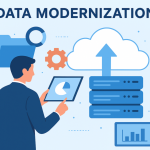In AI development, real-world data is both an asset and a liability. While it fuels the training, validation, and fine-tuning of machine learning models, it also presents significant challenges, including privacy constraints, access bottlenecks, bias amplification, and data sparsity. Particularly in regulated domains such as healthcare, finance, and telecom, data governance and … [Read more...] about Synthetic Data as Infrastructure: Engineering Privacy-Preserving AI with Real-Time Fidelity
Big Data
Learn everything you need to know about big data. Find out how companies are using this revolutionary technology and what it means for your business strategy.
How to Secure Data Science Jobs in the USA as a Fresher in 2026?
Data science jobs in the USA are growing rapidly. According to the U.S. Bureau of Labor Statistics, data-centric jobs such as data scientist, data engineer, and data analyst are expected to grow 35% from 2022 to 2032.The industries driving this tremendous growth are:Healthcare: Using patient data to predict diseases and improve treatments.Finance: Detecting fraud and analyzing … [Read more...] about How to Secure Data Science Jobs in the USA as a Fresher in 2026?
How do data modernization services reduce risk in legacy IT environments?
Every organization relies on data to run its daily operations, but the way that data is stored, accessed, and managed can make all the difference in performance and security. Legacy IT environments, while once reliable, now often stand in the way of agility and growth. Old systems tend to create bottlenecks, security gaps, and operational risks that can quietly erode business … [Read more...] about How do data modernization services reduce risk in legacy IT environments?
How Better Data Management Services Can Take Your Analytics from Messy to Meaningful
Today, the majority of modern organizations understand the importance of data. For startups, this usually means depending on reports produced within the separate software platforms that they use for day-to-day operations. However, sometimes, they encounter a situation where unifying data in a standard or centralized source is advisable. Maintaining and organizing this data … [Read more...] about How Better Data Management Services Can Take Your Analytics from Messy to Meaningful
SOCMINT Insights: Turning Digital Noise into Actionable Intelligence
In the current highly networked environment, social sites have turned out to be an enormous source of data. Each like, share, comment, or hashtag has a meaning that can influence the perception of the population, identify changes in the market, or even identify a new threat. The problem is not getting access to information, but how to sort through this cacophony of digital … [Read more...] about SOCMINT Insights: Turning Digital Noise into Actionable Intelligence
What is big data?
Big data is a term that refers to the massive amount of digital data created and shared every day. Big data can transform how we live, work, and communicate. It can be used to improve everything from public health and urban planning to business and marketing.
Big data is also changing the way we think about privacy and security. The volume, velocity, and variety of big data present challenges and opportunities for organizations and individuals. Regardless, big data is here to stay, and its impact will only continue to grow in the years to come.
What is big data analytics?
Big data analytics is the process of turning large, complex data sets into actionable insights. Businesses use various analytical tools and techniques, including machine learning and statistical analysis, to do this.
Big data analytics can be used to improve decision-making in areas like marketing, operations, and customer service. It can also be used to identify new business opportunities and optimize existing processes. With the help of big data analysis, businesses can gain a competitive edge by using their data better.
Want to learn more about big data? Datafloq has courses available. Contact us to get started.
When was big data introduced?
The term big data was coined in the 1990s, with some giving credit to John Mashey for popularizing the term. However, the concept of big data has been around for much longer.
Where does big data come from?
In the early days of computing, scientists and businesses began to realize that the amount of data being generated was increasing exponentially. As a result, they began to develop new methods for storing and processing data.
Over time, these methods have become increasingly sophisticated and have played a key role in enabling businesses to make sense of vast amounts of information. Today, big data is used in various industries, from retail to healthcare, and its importance is only likely to grow in the years to come.
What are examples of big data?
One of the most common examples of big data is social media data. With over 2 billion active users, Facebook generates a huge amount of data every day. This includes information on user interactions, posts, and even location data. Analyzing this data can help companies better understand their customers and target their marketing efforts.
Another example of big data is GPS signals. These signals are constantly being generated by devices like cell phones and fitness trackers. When combined with other data sets, GPS signals can be used to provide insights into everything from traffic patterns to human behavior. Finally, weather patterns are another type of big data set. By tracking these patterns over time, scientists can better understand the impact of climate change and develop strategies for mitigating its effects.
How do companies use big data?
Companies use big data in marketing, product development, and customer service. By analyzing large data sets, businesses can identify patterns and trends that would be otherwise difficult to spot. For example, a company might use big data to track customer behavior patterns to improve its marketing efforts.
Alternatively, a company might use big data to improve its products by identifying areas where customers are most likely to experience problems. For instance, big data can be used to improve customer service by finding pain points in the customer journey. Ultimately, big data provides companies with a valuable tool for gaining insights into their business operations.






